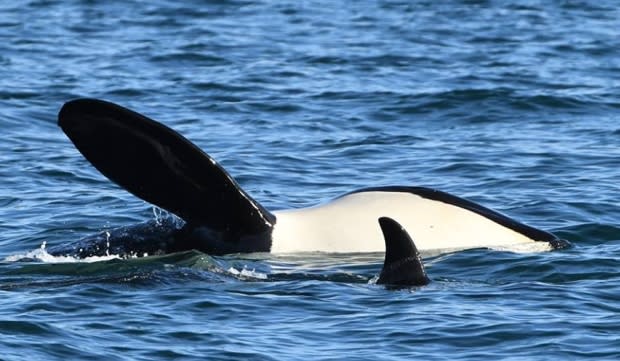New footage shows deteriorating condition of emaciated killer whale J17
A West Coast female killer whale, known as J17, has been on scientists' radar for several years because of how skinny she is — and it's only getting worse.
New aerial photos show that the orca, who's part of J pod and B.C.'s endangered southern resident killer whale population, has lost a significant about of body fat since last fall.
"It's unsettling," said Michael Milstein, public affairs officer with the Fisheries section of the U.S. National Oceanic and Atmospheric Administration.
The latest photos, taken in May, show white eye patches that trace the outline of her skull. It's a condition known as "peanut head" and is caused by fat loss.
A team of scientists with NOAA Fisheries' Southwest Fisheries Science Center in San Diego and SR3: Sealife Response, Rehabilitation, and Research, based in Seattle, Wash., have been keeping an eye on the J pod over the years.

Although J17's emaciated condition is worrying, Milstein said he hasn't lost hope that she may still survive.
"These whales are known to help each other — help provision each other with food and that type of thing," he said.
"She's still with the pod and with her calf, that's a good sign."
'Make sure they have room'
Milstein emphasized the importance of keeping a distance from the whales while they feed to allow them to recover.
"An important step at this point is to make sure they have room and calm surroundings in which to forage because they really rely on sound to do that," he said.
"When there are a lot of vessels around, that can interrupt their ability to forage even if there are fish available."
Canada recently announced new rules requiring ships to stay 400 metres away from the endangered southern resident killer whales. The rules go into effect starting in June.
The orcas feed in waters around the San Juan Islands in Washington State and the Gulf Islands of B.C.
The new rules are an important step to protecting the whales, Milstein said, but it's not enough by itself.
"The real answer here is to recover the salmon populations that [the whales] rely on so heavily," he said.
"It's not a quick fix, but it is what is going to create a sustainable foundation for recovery."

